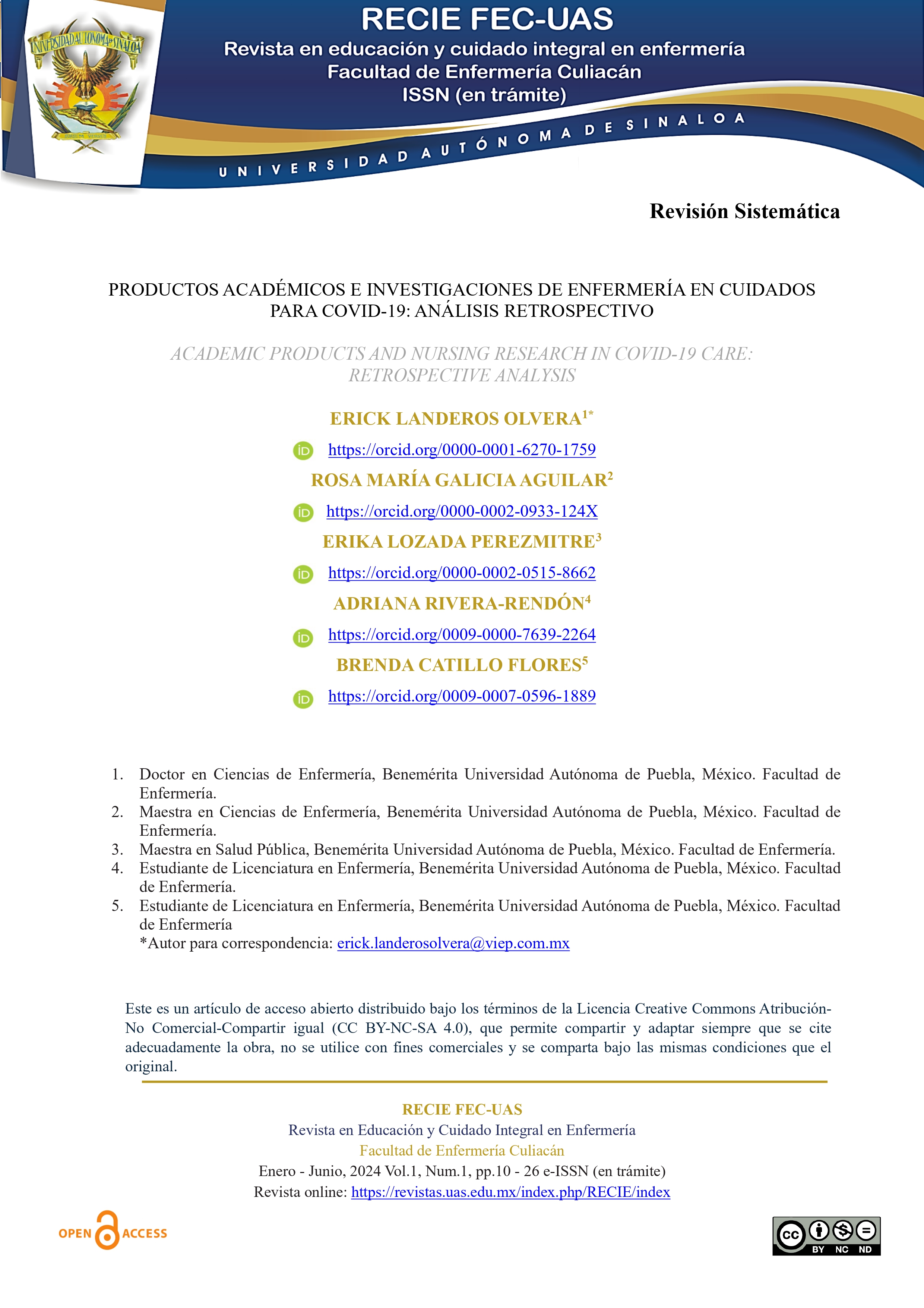Academic products and nursing research in COVID-19 care:retrospective analysis
Abstract
Introduction: At the beginning of the Covid-19 pandemic, manuscripts were published without time to verify their quality, a situation that warrants a retrospective analysis to reflect on the academic products that guided nursing care. Objective: Describe the characteristics of the publications made by nursing regarding care related to Covid-19 in the first semester of the pandemic. Method: Cross-sectional, retrospective design, through an adaptation of Cochrane rapid reviews to identify academic products and published articles, which included "care, nursing and Covid-19". Results: 718 academic products in Spanish were identified. 245 were excluded by title and abstract and 359 were eliminated after being evaluated. Of 114 products evaluated, 43% come from Spain. 22 investigations were evaluated, of which 13 were quantitative with a descriptive and correlational design, 9 qualitative, most of them phenomenological, using participant observation as an inquiry tool. Likewise, 92 academic products were evaluated such as technical guidelines and scientific communications, with preference on topics of care for the elderly and intensive therapy. Conclusions: Most of the eliminated articles were written by other disciplines about nursing care in the first semester of the pandemic. Although the need to have immediate information was justified, it is necessary to reflect on the lack of scientific nursing writing and its lessons learned. The rapidly published evidence was the main source for decision-making in nursing care for people with Covid-19 during the first semester of the pandemic
Downloads
References
Abuabara-Franco, E., Bohórquez-Rivero, J., Restom-Arrieta, J., Uparella-Gulfo, I., Sáenz-López, J., Restom-Tinoco, J. (2020). Infección por SARS-CoV-2 y enfermedad COVID-19: revisión literaria. Revista Salud Uninorte, 36(1), 196-230. Epub May 23, 2021. https://doi.org/10.14482/sun.36.1.616.211
Aleixandre, B., Castelló, L. y Valderrama, J. C. (2020). Información y comunicación durante los primeros meses de Covid-19. Infodemia, desinformación y papel de los profesionales de la información. https://recyt.fecyt.es/index.php/EPI/article/view/79622/60715
Arias, S. (2017). Epidemiología, equidad en salud y justicia social. Rev. Fac. Nac. Salud Pública.
http://www.scielo.org.co/scielo.php?script=sci_arttext&pid=S0120-386X2017000200186
Belli, S., Mugnaini, R., Baltà, J., & Abadal, E. (2020). Coronavirus mapping in scientific publications: When science advances rapidly and collectively, is access to this knowledge open to society? Scientometrics, 124(3), 2661–2685. https://doi.org/10.1007/s11192-020-03590-7
Campbell, M. (2020). Is research quality being compromised during the COVID-19 Pandemic?.Technology Networks Blog. https://www.technologynetworks.com/tn/articles/is-research-quality-being-compromised-during-the-covid-19-pandemic-333849
Centro Nacional de Epidemiología. Covid 19 en España. (2020). Documentación y datos. Incidencias acumuladas y curvas epidémicas. https://cnecovid.isciii.es/covid19/#documentaci%C3%B3n-y-datos
Cobarsí-Morales, J. (2020). Covid-19: fuentes de información cuantitativa. Anuario ThinkEPI, 14. https://doi.org/10.3145/thinkepi.2020.e14d02
Enago Academy. (Julio, 2020). Preimpresiones en los tiempos del COVID-19: ¿Por qué deberías usarlas?.https://www.enago.com/es/academy/use-of-preprints-during-global pandemic/?utm_source=emailer&utm_medium=email&utm_campaign=news_jul20
Fraser, N., Brierley, L., Dey, G., Polka, J., Pálfy, M. y Coates, J. (2020). Preprinting a pandemic: the role of preprints in the COVID-19 pandemic. BioRxiv, 1-36. http://biorxiv.org/content/early/2020/05/23/2020.05.22.111294.abstract
García, R.M., Gómez, A.M.G., Aguilar, P.I., Pérez, M.G.P., Velázquez, D.L., Soriano, S.M., Landeros, O.E. (2011). Tendencias y características de la investigación en enfermería publicada en México. Revista Enfermería Universitaria ENEO-UNAM, 8(1), 7-16.
Garritty, C., Stevens, A., Gartlehner, G., King,V., Kamel, C. (2016). Rapid Reviews Methods Group to play a leading role in guiding the production of informed high-quality, timely research evidence syntheses. Syst Rev, 5(1),184. https://doi.org/10.1186/s13643-016-0360-z
Guzmán-Mendoza, E., Santos-Diaz, M., Cabañas-Benitez, G., Pérez- Calderón D., Chávez-Aguilar C., Morales-Aguilar, M., y Landeros-Olvera E. (2020). Evaluation of randomized clinical essays developed by nurses according to the consort declaration criteria. Enfermería Global.; 17(1), 478-499.
Landeros-Olvera, E., Ramírez-Girón, N., Yáñez-Lozano, A., Guzmán-Ramírez G., Galicia-Aguilar, R. (2018). Temáticas y características metodológicas de la investigación de enfermería publicada en revistas mexicanas: 2010-2015. Enfermería Universitaria, 15(3), 274-283. https://doi.org/10.22201/eneo.23958421e.2018.3.65994
Landeros-Olvera, E., Ramírez-Girón, N., Galicia-Aguilar, R. M., Alba-Alba, C., Lozada-Perezmitre, E., & Rodríguez-Hernández, M. J. (2023). Producción científica en revistas mexicanas de enfermería: análisis descriptivo y bibliométrico del periodo 2016-2020. Enfermería universitaria, 19(1), 4–19. https://doi.org/10.22201/eneo.23958421e.2022.1.1276
Martín-Martín, A., Orduna-Malea, E., Thelwall, M., & Delgado López-Cózar, E. (2018). Google Scholar, Web of Science, and Scopus: A systematic comparison of citations in 252 subject categories. Journal of Informetrics, 12(4), 1160–1177. https://doi.org/10.1016/j.joi.2018.09.002
Moher, D., et al. (Agosto, 2009). Preferred reporting items for systematic reviews and metaanalyses: the PRISMA statement. Vol.151, Núm. 4. https://www.acpjournals.org/doi/full/10.7326/0003-4819-151-4-200908180-00135
Moher, D., Schultz K., Altman D. (2002). La Declaración CONSORT: Recomendaciones revisadas para mejorar la calidad de los informes de ensayos aleatorizados de grupos paralelos. Revista de Sanidad Militar, 56(1), 23–28.
Organización Mundial de la Salud [OMS]. (2020) “Cronología de la respuesta de la OMS a la COVID-19”. https://www.who.int/es/news-room/detail/29-06-2020-covidtimeline
Reyna, E. (2019). Aspectos deontológicos de la enfermería. En: Deontología de la enfermería. Chimbote, Perú: Universidad Católica Los Ángeles de Chimbote pp. 23-26. http://repositorio.uladech.edu.pe/bitstream/handle/123456789/14783/DEONTOLOGIA%20DE%20LA%20ENFERMERIA.pdf?sequence=3
Sarango, E. (2019). La ética Kantiana como base para una educación con carácter moral. https://revistas.unheval.edu.pe/index.php/rifce/article/view/580/460
Secretaría de Salud. (2024). Reglamento de la Ley General de Salud en Materia de Investigaciones para la Salud. Ley Gen Salud. https://www.diputados.gob.mx/LeyesBiblio/pdf/LGS.pdf
Sobrido Prieto, M., Sobrido Prieto, N., González Guitián, C., Pichel Guerrero, M. J., García Sánchez, M. M., y Prieto Díaz, A. (2005). Revistas españolas de Enfermería en bases de datos nacionales e internacionales. Index de enfermería, 14(48–49), 74–77. http://scielo.isciii.es/scielo.php?script=sci_arttext&pid=S1132-12962005000100020
Springer Nature. All of the articles from our official journals relevant to the novel coronavirus are freely available. https://www.springernature.com/gp/researchers/campaigns/coronavirus
Torres-Salinas, D. (2020). Ritmo de crecimiento diario de la producción cientí¬fica sobre Covid-19. Análisis en bases de datos y repositorios en acceso abierto. Profesional De La información, 29(2). https://doi.org/10.3145/epi.2020.mar.15

Downloads
Published
Issue
Section
License
Copyright (c) 2024 RECIE FEC-UAS Revista de educación y cuidado integral en enfermería Facultad Enfermería Culiacán

This work is licensed under a Creative Commons Attribution-NoDerivatives 4.0 International License.

